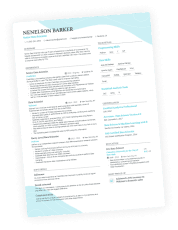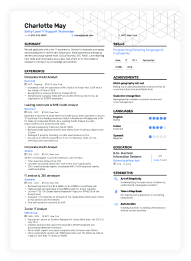Financial Modeling Skills: Example Usage on Resumes, Skill Set & Top Keywords in 2024
Including financial modeling on your resume suggests to recruiters that you possess strong analytical skills and an aptitude for detailed financial analysis. Explore the guide below for creative ways to present your abilities and enhance your resume's appeal.


Is your resume ATS-friendly?
Drop your resume here or upload a file to find out if the skills in your resume are readable by an ATS.
Financial modeling is a skill that involves creating a mathematical representation of a company's financial operations, often using spreadsheets like Excel. This allows someone to forecast a business's financial performance into the future by taking into account various factors, such as historical data, market trends, and operation metrics. For your resume, having financial modeling as a skill indicates that you have the ability to analyze financial data in depth, predict outcomes based on that data, and make informed financial decisions or recommendations.
Adding financial modeling to your resume can be a double-edged sword. While it showcases analytic prowess and decision-making capabilities, it might falsely imply that you're primarily numbers-oriented and lack creativity or interpersonal skills. To strike a balance, it's good practice to equally emphasize communication and problem-solving abilities. Coupling these with financial modeling suggests that you can not only manage data but also collaborate and innovate based on the insights derived from it.
In this article, you will learn:
- The potential downsides of listing financial modeling as a standalone skill on your resume.
- How to properly balance technical and soft skills to present a well-rounded candidate profile.
- Alternative ways to phrase "financial modeling" to keep your resume fresh and engaging.
- The benefits of pairing financial modeling with softer skills on your resume.
- Different ways to articulate your proficiency in financial modeling.
- Real-life examples demonstrating both effective and poor ways to list financial modeling on your resume.
Misusage of financial modeling on resumes
Financial modeling is a crucial skill for various finance roles, but overstating your expertise or misrepresenting how you've applied this skill can harm your credibility. It's important that your resume truthfully reflects your abilities, so avoid inflating your experience or implying proficiency that exceeds your actual level. Here are a few examples of how financial modeling skills can be misused in a resume:
- Summary Section: "Expert in financial modeling and analysis with a track record of doubling company revenue through innovative model development." This statement could be misleading if you were part of a team and your direct impact was marginal.
- Experience Section: "Solely responsible for crafting complex financial models that predicted market trends and informed executive decisions." This could come across as deceitful if the models were simple templates or if you had considerable guidance.
- Achievements Section: "Recognized for designing a predictive financial model that transformed the business strategy and drove a 300% increase in profits." Overstated claims like this might be questioned if the increase was due to a range of factors, and the model's role was not as significant.
How to demonstrate financial modeling skills on your resume
- Include specific examples of financial models you've created, such as discounted cash flow (DCF) models, three-statement models, or merger and acquisition models.
- Highlight any advanced Excel skills you possess, such as pivot tables, macros, and complex formulae that you have used in your financial modeling projects.
- Detail your experience with financial analysis software or programming languages, like Python or R, which are often employed in more sophisticated financial modeling tasks.
- Showcase your ability to interpret financial data and make accurate forecasts by mentioning any past projects where your models significantly aided in decision-making processes.
- Quantify your achievements, if possible, by stating how your financial models improved efficiency, increased revenue, or reduced costs, providing clear, measurable outcomes of your work.
Example 1: Demonstrate financial modeling in the experience section
- •Spearheaded the development of a new financial model to forecast annual revenue, improving prediction accuracy by 20%.
- •Conducted a comprehensive budget analysis that reduced expenses by 15%, leading to an overall profit increase for the fiscal year.
- •Managed a portfolio of investments totaling over $500 million, achieving a 10% return over a two-year period.
- •Oversaw a complex budget reallocation project which led to a 5% cost saving in operational expenses over a 12-month period.
- •Implemented a new financial reporting system, reducing the monthly report generation time by 30%, thus enhancing the team’s productivity.
- •Piloted a risk assessment strategy that mitigated financial discrepancies, resulting in a 25% decrease in unaccounted-for expenses.
- •Collaborated with cross-functional teams to reduce quarter-end closing time by 20%, enhancing report timing for stakeholder decision-making.
- •Executed an internal audit for a major client, identifying significant cost-saving opportunities that were then implemented to improve efficiency.
- •Assisted in the launch of a financial consolidation tool that streamlined data collection from multiple subsidiaries.
- This resume example clearly illustrates the breadth of financial expertise through varied work experiences across leading firms like Goldman Sachs, Amazon, and Deloitte.
- Every bullet point is specific, quantifiable, and highlights significant achievements, revealing the candidate's direct impact on business outcomes.
- By presenting diverse challenges and responses, the experience section underscores a wide skill set, showing adaptability and problem-solving capabilities.
- The resume uses present-day terms and recent dates, making it relevant and aligned with the current job market and industry standards.
- Notice the omission of overused jargon, with emphasis on concrete results, reflecting a strong understanding of key financial processes and their implementation.
Example 2: Demonstrate financial modeling in the summary section
- The summary clearly establishes the applicant’s extensive experience (over 10 years) in financial analysis and modeling, which directly indicates proficiency and expertise.
- Technical skills in Excel are made concrete by mentioning "advanced functions and pivot tables", which are crucial tools for financial modeling.
- The individual's major career achievement, predicting a 20% revenue increase, showcases an ability to effectively apply their skills to real-world business scenarios.
- The enthusiasm for analysis and strategy improvement is conveyed through the applicant's expressed passion for using their abilities to nurture financial strategy and decision-making processes.
- Direct language is used to concisely describe the candidate's background and achievements without resorting to overly complex terminology or cliches, making the statement accessible to a broad audience.
Example 3: Demonstrate financial modeling in the achievements section
- Shows direct impact with percentages that measure success.
- Reflects leadership and team collaboration to achieve financial goals.
- Demonstrates proactive problem-solving by addressing cost issues.
- Indicates an improvement in efficiency with the introduction of automation.
- Avoids overused buzzwords, focusing instead on clear, quantifiable results.
- Each entry is concise, with descriptions that get to the point and offer specific examples.
What are the relevant certifications for financial modeling skills on resume
If you're looking to strengthen your resume with financial modeling expertise, here are some certifications that may prove valuable:
The top 5 certifications for gaining financial modeling skills expertise:
Top skills people add together with financial modeling skill on resume:
Excel
Data Analysis
Valuation
Corporate Finance
Financial Reporting
Budgeting
Forecasting
Accounting
Risk Management
Business Intelligence Tools
Analytical Thinking
Problem Solving
Attention to Detail
Critical Thinking
Communication
Time Management
Adaptability
Teamwork
Leadership
Initiative
Decision Making
Most relevant jobs for financial modeling skills
- Investment Banker - As an investment banker, you analyze financial data to assist with mergers, acquisitions, and the issuance of bonds and stocks.
- Financial Analyst - You assess the performance of investments such as stocks and bonds, and assist companies with forecasting their financial futures.
- Management Consultant - Working in this role, you help organizations improve their performance by analyzing existing organizational problems and developing plans for improvement.
- Private Equity Analyst - In private equity, you evaluate investment opportunities and manage portfolios of companies with the goal of increasing their value over time.
- Corporate Financial Planner - Your work contributes to the company's financial health by analyzing costs, revenues, financial commitments, and obligations to predict future revenues and expenses.
- Business Analyst - You'll be the bridge between IT and the business stakeholders, understanding and analyzing business processes and how technology can improve them.
- Project Manager - Handling projects of all sizes, you need to keep a close eye on the budget, which often requires building and maintaining financial models.
- Chief Financial Officer (CFO) - As a top executive, you manage the financial actions of a company, including tracking cash flow and planning the company's financial strategy.
- Risk Manager - Assessing and identifying the potential risks that may hinder the reputation, safety, security, and financial success of an organization is your primary task.
- Real Estate Developer - When planning and executing real estate projects, you need to forecast costs and revenues to ensure the project is financially viable.
Key takeaways
- Financial modeling is a valuable skill that enhances your resume by demonstrating your ability to create detailed financial projections and analyses.
- Avoid common financial modeling pitfalls, such as overcomplicating models or making unfounded assumptions, by staying grounded in factual data and using straightforward techniques.
- Showcase your financial modeling expertise on your resume by listing relevant projects, certifications, and tools you're proficient with, such as Excel or specialized software.
Make one that's truly you.




